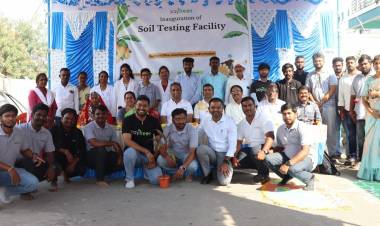Department of IT Bihar - Transforming Governance in Covid-19 Era Bihar's government has made extensive use of technology to combat the pandemic and assist all segments of society during these trying times- Jibesh Kumar

Department of IT Bihar - Transforming Governance in Covid-19 Era
Bihar's government has made extensive use of technology to combat the pandemic and assist all segments of society during these trying times- Jibesh Kumar
The COVID-19 pandemic was one of the worst times in many decades, but one silver lining is that the COVID-19 crisis pushed companies and governments over the technology tipping point—and forever changed business. It has brought about 5 years of change in digitization in just over a year.
During the COVID-19 pandemic, technology was critical in keeping our society running during lockdowns and quarantines. Furthermore, these technologies may have a long-term impact beyond COVID-19. Many new trends have emerged in the world, impacting our day-to-day needs. There are no sectors that have been unaffected by the change. We have seen trends such as OTTs replacing TV/Cinema, Ola/Rapido/uber becoming new transportation norms, Classroom learning shifting to online AI based learning, Tele consultation becoming new norms for OPDs, Grocery traction to apps such as BigBasket, Amazon and Flipkart becoming new shopping destinations, office meetings shifting to zoom/google meet/teams, and so on.
“Bihar's government has made extensive use of technology to combat the pandemic and assist all segments of society during these trying times." Said Hon’ble Minister, IT Bihar, Shri Jibesh Kumar.
Key initiatives of the state are as follows:
A. Garur App: The Bihar government launched the "Garur App" to track and monitor migrants and all those who have arrived in the state via rail, road, and flight from across the country and abroad. The app has aided in the tracking of over two lakh international and domestic travellers in Bihar, as well as the mapping of their skills. The app was created by the Bihar Disaster Management Department.
B. Bihar Corona Sahayata app: To combat COVID-19, the Bihar state government launched the Bihar Corona Sahayata app. Under the Bihar Aapda Prabandhan, the Bihar government provided a Corona Sahayata of Rs 1000 to each worker who entered Bihar from other states or was stranded outside Bihar. The application was chosen as a winner in the "pandemic category" of the central government's Digital India Awards 2020.
C. HIT stands for Home Isolation Tracking. The Covid App that has aided health workers in the regular monitoring of home-bound patients. Every day, the health worker visits the patient's home and enters temperature and oxygen data into an app via mobile/tablet. These data sets are monitored at the district level, and if the oxygen level falls below a certain threshold, the patient is transferred to a nearby healthcare facility. This has aided the government in reaching out to a large number of homebound patients and saving lives. BSEDC created the app with the help of the Health Department and the IT Department.
D. eLabharthi: The e-Labharthi System is intended to be a major transformation in electronic service delivery and financial inclusion by avoiding the pain points of existing service delivery mechanisms. Banks have the ability to transfer funds directly to the bank accounts of identified beneficiaries. DBT of all Education Department schemes, including the Chief Minister's bicycle, dress, scholarship, meritocracy, incentive amount, and the Chief Minister's Kishori Swasthya Yojana, will go directly to students. In a single year, more than 60 lakh beneficiaries from various schemes have benefited from the scheme.
E. ePDS (Electronic public distribution system): In a significant relief to those battling the Covid-19 pandemic, the state government has provided free rationing to approximately The state government continued to monitor other assistance, such as providing free rations to 1.64 million ration card holders and depositing Rs 1000 in their accounts.
F. Skill development in the IT/ITeS sector: The Department of Information Technology, Government of Bihar, provides technical skill training to Bihar youths across the state for 9 different courses and through 117 skill development centres in the IT/ITeS domain. Bihar's technically skilled workforce will be a valuable asset to investors and entrepreneurs.
G. Healthcare initiatives: Initiatives taken by the healthcare sector during covid to strengthen it during pandemic times:
· eSanjeevani: Using eSanjeevani, patients in remote villages would be able to receive medical advice via video conference with the primary health care centre and district level sadar hospital.
· Amazing app: it would aid in providing better healthcare to pregnant women.
· Referral transport tracking system: people would benefit from a more efficient and timely ambulance service.
· The Ashwin portal ensures that asha workers, who are the backbone of village healthcare, receive their incentives on time.
H. VC Application for online meetings: Online meetings have become the norm of the day, and obtaining Microsoft Teams meeting licences has ensured this. BSEDC has provided various departments with Microsoft team licences for online meetings. This has aided the department's ability to function during lockdown
· College Wifi: The Bihar government has installed wifi on college campuses so that students can download books and study materials from outside sources.
The IT department is planning to use cutting-edge technology in service delivery, such as artificial intelligence, IoT, blockchain, and Big data. Some IT department initiatives that are being implemented or planned to transform the way government functions in the new normal brought about by the pandemic include: Blockchain-based Land Ledger, GIS, Use of AI and IoT in Agriculture, Use of AI and Big data in Security and surveillance, CFMS, eOffice, eVidhan, Security Operation Centre, Bihar State Data Centre 2.0, Smart Village, and so on.
As the government expands its presence in cyberspace, we must become more aware, responsible, and responsive to the risks that come with it. Every single day, we rely on the world of cyberspace. Our hardware and software, our desktops, laptops, and cell phones, have become inextricably linked to every aspect of our lives. It's the broadband networks beneath us, as well as the wireless signals all around us. We use the Internet to pay our bills, bank, shop, file our taxes, and so on.
So, yes, cyberspace exists. And so are the associated risks.
It's a great irony of our Information Age that the same technologies that allow us to create and build also allow those who want to disrupt and destroy to do so. And this paradox – seen and unseen – is something we encounter on a daily basis.
To stay ahead of cyber criminals who wish to harm us, we must learn a completely new vocabulary. Recognizing this need, the Department of Information Technology is already in the process of establishing a Security Operation Centre and hiring security experts.
We can summarise the concept of Transforming Governance as:
Where governance derives from transparency, accountability, and dependability, where governance never loses touch with the common man, where free flow of information is the foundation of prosperity, where governance extends far beyond government, Bihar awakens into the heaven of the ICT era.




















